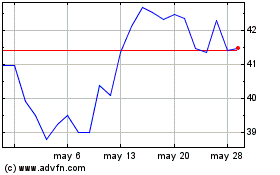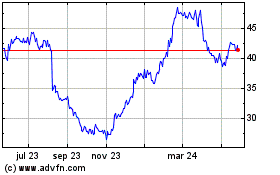Coach, Kors Owners Find Building a Luxury Conglomerate Is Hard to Do
06 Noviembre 2019 - 11:13AM
Noticias Dow Jones
By Allison Prang
The owners of Coach and Michael Kors have tried to expand beyond
their core handbag brands, but their strategy to build U.S. luxury
conglomerates has yet to bear fruit.
Capri Holdings Ltd., which acquired Versace and Jimmy Choo to
accompany Kors, reported lower profits in its latest quarter.
Executives put much of the blame on the turmoil in Hong Kong, a key
market for luxury sellers.
Coach owner Tapestry Inc., which bought rival Kate Spade and
boot maker Stuart Weitzman, posted lower quarterly sales and
profits on Tuesday, due in large part to problems at its acquired
brands.
Shares of Capri fell 1.8% Wednesday morning and are down 12%
year to date. Shares of Tapestry dropped 3.7%, and have declined
23% in 2019.
Executives at both companies defended their strategies to
diversify, despite the lackluster latest results. They said they
are on track to revamp their operations and reaffirmed their
revenue and earnings forecasts for the full year.
"We believe the power of our three fashion luxury houses keep us
on track to accelerate growth over the long term," Capri Chief
Executive Officer Jon Idol said on the company's call
Wednesday.
Capri reported a profit of $73 million, down by almost half from
the comparable quarter a year earlier. The company's earnings per
share missed Capri's own expectations as a result of higher costs
and challenges in Hong Kong.
The Michael Kors division reported a slight increase in
comparable sales adjusting for moves in currency. Comparable sales
-- an important measure of sales growth in the retail industry that
looks at performance at stores usually open at least a year -- were
flat at Versace and fell for Jimmy Choo, both after adjusting for
moves in currency.
Michael Kors brings in most of Capri's revenue, but revenue from
the brand fell in the most recent quarter. Capri's total revenue
was $1.44 billion, up 15%, reflecting the addition of Versace,
which had $228 million in quarterly sales.
Versace sales in China were also hurt by controversy over a
Versace T-shirt that listed Hong Kong as both a city and a country.
It sparked a backlash on Chinese social media. The company and
designer Donatella Versace issued public apologies in August.
"We're slowly seeing that subside," Mr. Idol said, but the company
lowered its forecast for Versace sales in China for the balance of
the year.
Tapestry, a day earlier, reported $20 million in quarterly
profit, down from just over $122 million a year earlier. Net sales
fell and selling, general and administrative costs rose.
At Tapestry, only the Coach brand increased sales, which
increased 1% to $966 million for the period that ended Sept. 28.
Sales at Kate Spade and Stuart Wetizman fell 6% and 8%
respectively.
Tapestry CEO Jide Zeitlin said he still believes in owning
multiple brands. Mr. Zeitlin, who serves as the company's chairman,
replaced Victor Luis as CEO in September.
"One of the things that clearly we're very focused on is how to
unlock even further benefits of our multibrand model," Mr. Zeitlin
said on the company's call. "I very much believe that our brands
are stronger together."
The U.S. companies have been building holding companies to
mirror European luxury houses like LVMH. But they have so far
struggled to show that owning multiple brands pays off. LVMH,
meanwhile, has made a bid for Tiffany & Co., looking to add a
U.S. brand to its portfolio.
Write to Allison Prang at allison.prang@wsj.com
(END) Dow Jones Newswires
November 06, 2019 11:58 ET (16:58 GMT)
Copyright (c) 2019 Dow Jones & Company, Inc.
Tapestry (NYSE:TPR)
Gráfica de Acción Histórica
De Jun 2024 a Jul 2024

Tapestry (NYSE:TPR)
Gráfica de Acción Histórica
De Jul 2023 a Jul 2024
